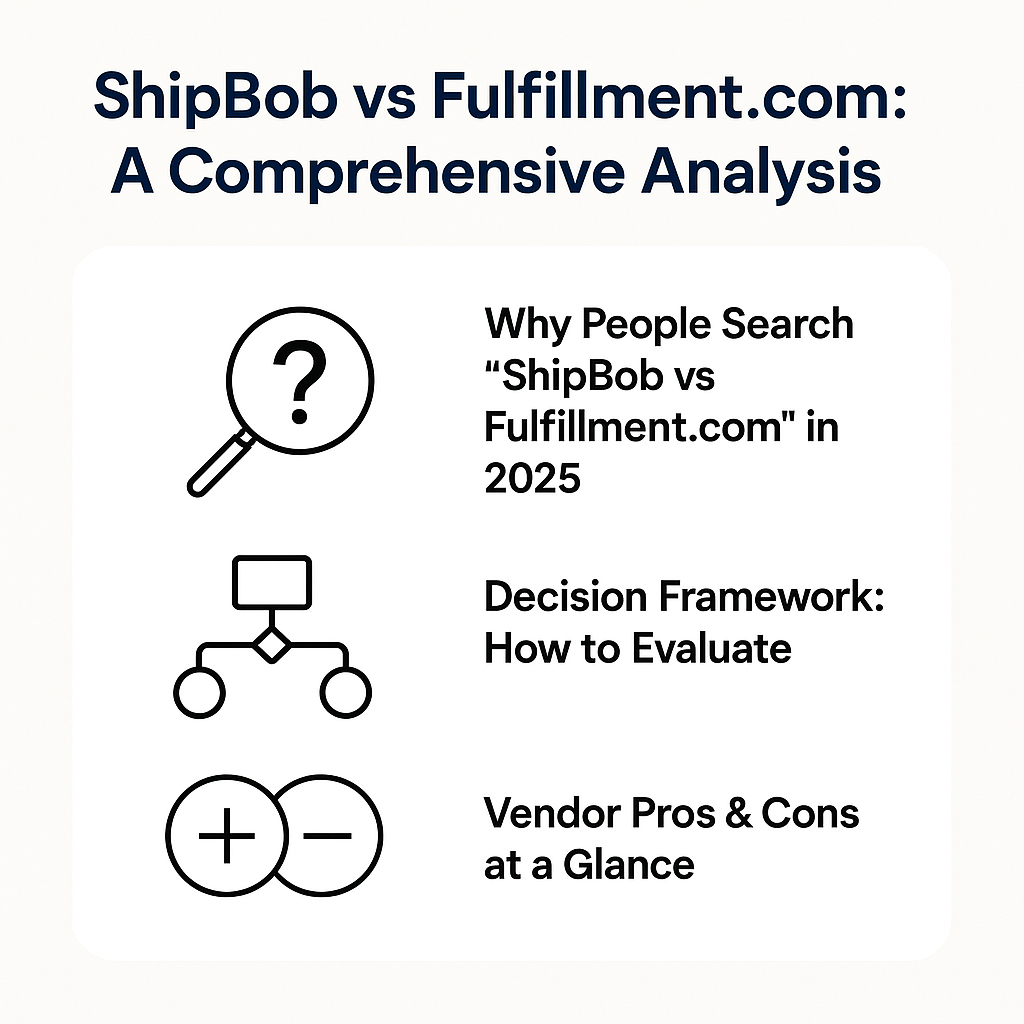
ShipBob vs Fulfillment.com
Choosing the right third-party logistics (3PL) provider can feel like navigating a maze, especially when comparing options like ShipBob vs Fulfillment.com. This guide promises to demystify the process, offering a clear path to making an informed decision.
Why People Search ‘ShipBob vs Fulfillment.com’ in 2025
In 2025, the logistics landscape is rapidly evolving with trends like AI-driven forecasting and a strong push towards sustainability. Businesses are increasingly scrutinizing 3PL providers to ensure they align with these trends. The search for ‘ShipBob vs Fulfillment.com’ reflects a need to compare providers that can offer not just basic fulfillment services, but also advanced technological integrations and eco-friendly practices.
Logistics managers and ecommerce founders are under pressure to optimize supply chains for speed and cost-efficiency while also meeting consumer demands for sustainable practices. Choosing between ShipBob and Fulfillment.com often boils down to which provider can better support these strategic goals.
- Consider how each provider integrates with AI tools for demand forecasting.
- Evaluate their commitment to sustainability, such as carbon-neutral shipping options.
- Assess their ability to scale with your business as it grows.
Decision Framework: How to Evaluate
When evaluating ShipBob vs Fulfillment.com, it’s crucial to establish a decision framework that aligns with your business priorities. Start by identifying the core areas where you need support: speed, cost, technology integration, and sustainability.
Both providers offer unique strengths, so mapping these against your operational needs will clarify which is the better fit. For instance, if rapid scaling and tech integration are top priorities, one provider might stand out more than the other.
- Define your primary logistics goals: cost reduction, speed, or sustainability.
- Rank the importance of features like technology integration and customer support.
- Consider future growth and how each provider can accommodate expansion.
Vendor Pros & Cons at a Glance
- ShipBob Pros: Strong tech integration, extensive US network, good for small to mid-sized businesses.
- ShipBob Cons: Limited international reach, higher costs for smaller volumes.
- Fulfillment.com Pros: Global reach, competitive pricing for high volumes, robust customer support.
- Fulfillment.com Cons: Less tech-focused, potential delays in tech updates.
ShipBob excels in tech integration and is ideal for businesses focusing on the US market, while Fulfillment.com offers a broader international reach and competitive pricing for larger operations. The choice largely depends on your geographic focus and volume needs.
Pricing & Total Landed Cost: What Really Moves the Number
Pricing is often the deciding factor when choosing a 3PL. Both ShipBob and Fulfillment.com offer competitive pricing models, but the total landed cost can vary significantly based on your specific needs.
Understanding the nuances of each provider’s pricing structure will help you make a more informed decision. Consider factors like storage fees, pick and pack costs, and shipping rates.
- ShipBob typically charges higher for smaller volumes but offers discounts as volume increases.
- Fulfillment.com provides competitive rates for international shipping, which can be beneficial for global operations.
- Analyze the impact of storage fees and how they align with your inventory turnover rates.
Feature-by-Feature Comparison
- Technology Integration: ShipBob offers seamless integrations with popular ecommerce platforms; Fulfillment.com has basic integrations but is improving.
- Network Reach: ShipBob has a strong US presence; Fulfillment.com covers more international markets.
- Customer Support: Fulfillment.com excels with 24/7 support; ShipBob offers robust but less frequent support.
- Scalability: ShipBob is ideal for rapid scaling within the US; Fulfillment.com supports global scaling better.
ShipBob’s strength lies in its technology and US network, making it a strong contender for domestic operations. Fulfillment.com, on the other hand, is better suited for businesses looking to expand internationally with its extensive global reach.
Scenario Playbook: Who Should Choose What?
- US-Based Startups: ShipBob is ideal due to its tech integration and domestic focus.
- Global Expansion: Fulfillment.com is better suited for businesses looking to expand internationally.
- High Volume Operations: Fulfillment.com offers competitive rates that benefit large-scale operations.
Onboarding & Risk Mitigation
Onboarding with a new 3PL can be daunting, but both ShipBob and Fulfillment.com offer structured processes to ease the transition. Understanding these processes can help mitigate risks associated with switching providers.
ShipBob provides a tech-driven onboarding process, which can be beneficial for tech-savvy teams. Fulfillment.com, meanwhile, offers a more hands-on approach, which might suit businesses that prefer direct support.
- Assess the onboarding timeline and resources provided by each provider.
- Consider the level of support offered during the transition phase.
- Evaluate risk mitigation strategies, such as backup plans and contingency measures.
Expert Take
Having worked with both ShipBob and Fulfillment.com, I recall a client who needed to pivot quickly due to unexpected demand spikes. ShipBob’s tech integration allowed them to scale efficiently within the US, while Fulfillment.com’s global reach supported their international expansion. The key takeaway? Align your choice with your strategic goals and operational needs.
Further Reading
FAQs
How do pricing models differ for ‘ShipBob vs Fulfillment.com’?
ShipBob generally charges higher for smaller volumes, while Fulfillment.com offers competitive rates for high-volume international shipping.
What support model should I expect?
Fulfillment.com provides 24/7 support, whereas ShipBob offers robust but less frequent support.
Which industries benefit most?
ShipBob is ideal for tech-savvy startups in the US, while Fulfillment.com suits global enterprises.
How long does onboarding take?
Onboarding timelines vary, with ShipBob offering a tech-driven process and Fulfillment.com providing a hands-on approach.
Can multi-node reduce both cost and transit time?
Yes, both providers offer multi-node strategies that can optimize cost and transit time.
Next Steps
Ready to make a decision? Compare quotes or schedule a consultation to find the best fit for your logistics needs.

Leave a Reply